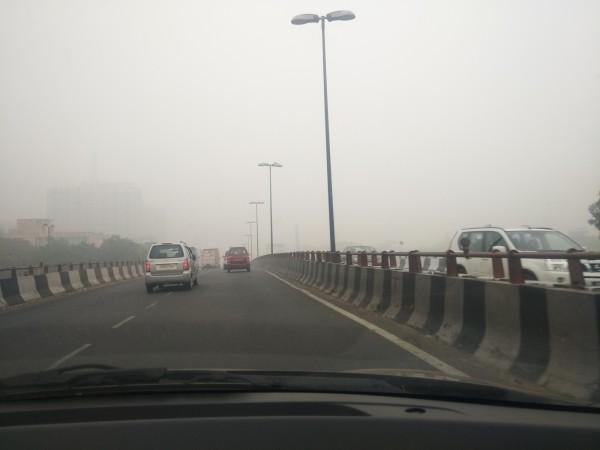
As the air quality in Delhi and adjoining regions turned toxic, authorities in the capital city implemented the odd-even traffic rationing scheme on Monday, November 4, starting 8 am, in a bid to curb domestic carbon emission.
Around 200 teams of Delhi police have been deployed in various parts of the city to ensure compliance and nearly 5,000 civil defence volunteers have been trained to spread awareness.
Taking to Twitter, Delhi Chief Minister Arvind Kejriwal appealed the residents to follow the rules. "Namaste Delhi. Odd-even is starting today to reduce pollution. Do follow odd-even for yourself, your children's health and for the sake of your family's breath. Share cars. This will build friendship, strengthen relationships as well as save petrol and reduce pollution. Delhi will show it again," he wrote in Hindi.
The violators will be penalised Rs 4,000.
What is odd-even scheme?
The odd-even scheme is a traffic rationing measure implemented by the Kejriwal government, under which private vehicles with registration numbers ending with an odd digit (1, 3, 5, 7, 9) will be allowed on roads on odd dates and those with an even digit (0, 2, 4, 6, 8) on even dates.
This is the third round of implementation of the scheme in the national capital, with its likely conclusion on November 15, if the pollution levels are controlled.
The rule will also apply to with vehicles with registration numbers of other states and will not be effective on Sunday, November 10.
Exemption from the rule
Two-wheelers and electric vehicles have been exempted from the scheme, except those running on Compressed Natural Gas (CNG). Vehicles carrying school children in uniform and those being used for medical emergencies have also been exempted. Women have been exempted from the scheme too. Vehicles occupied by a person with disabilities have also been exempted.
The vehicles of Delhi police paramilitary forces, Army, Prime Minister, Union Cabinet Minister, Governors and President will also be exempted.

Additional public transport operation
The Delhi Metro will operate 61 additional trips between Monday and November 15. The Delhi government has also roped in 500 extra buses to operate on different routes. Cab aggregators Ola and Uber have also agreed to not implement surge-pricing during the odd-even scheme.
Emergency meet
Meanwhile, the Principal Secretary to Prime Minister, PK Mishra, reviewed the grave situation of severe air pollution in Delhi, it's adjoining NCR region and other parts of North India on Sunday in a high-level meeting.
Senior officials from the States of Punjab, Haryana and Delhi - the three states most affected, joined the meeting through video conferencing.
The Cabinet Secretary Rajiv Goba will monitor the situation with these States on a daily basis and instruct necessary actions, to facilitate better coordination. The three states are ruled by different political parties which resulted in a lot of politicking and blame game.
Chief Secretaries of these States have been asked to monitor the situation right at the district level in their respective States, on a 24x7 basis.
This is the first of its kind emergency intervention that has taken place this season with unprecedented air pollution which hovered over 625 AQI in over all Delhi on Sunday and hitting the 999 mark at parts of the national capital like Bawana. The capital woke up to thick layers of smog and near-zero visibility that forced diversion of many flights to Delhi airport on Sunday.
Pollution takes a political hue
The move came on a day the Aam Aadmi Party held a press conference demanding an answer from the Union Environment Minister Prakash Javadekar in "next one hour" on when he intends to convene an emergency meeting of state environment ministers of North Indian states.
The Aam Aadmi Party targeted BJP and Congress in the same vain, by flashing maps of stubble burning from Punjab and questioning the alleged Javadekar's inaction.
"There is not a single corner in Punjab where stubble burning hasn't taken place. Entire north India is under the thick cloud of smog. Half of the population is under risk. But why has not Prakash Javadekar called a single emergency meeting in the last 5 days?" asked Atishi Marlena of the AAP.

Meanwhile, DPCC Chief Subhash Chopra led an agitation in front of Kejriwal's residence demanding accountability. In an animated protest, the Delhi Congress shouted anti-Kejriwal slogans. However, Punjab Chief Minister Captain Amarinder Singh's reaction was much more measured. He wrote to Prime Minister Modi on Saturday, stressing the need to build a consensus on tackling the issue apolitically.
Delhi BJP chief Manoj Tiwari started distributing masks as a way to "highlight" the alleged inefficiency of the Kejriwal government in tackling pollution. He said that the BJP will be distributing about one lakh masks in Delhi over the next 15 days.
Delhi CM Kejriwal was not far behind as he too distributed masks to school children in the capital amid rising PM 2.5 levels. In retort to BJP's 1 lakh mask, Kejriwal promised to distribute a whopping 50 lakh masks. Though, doctors say, the mask that distributed by both can hardly be helpful in dealing with a grim situation as Delhi is in right now.
The politics of pollution started much earlier when the AAP had accused the BJP of instigating people in Delhi to burst crackers on Diwali so that the pollution level soars.
(With agency inputs.)








